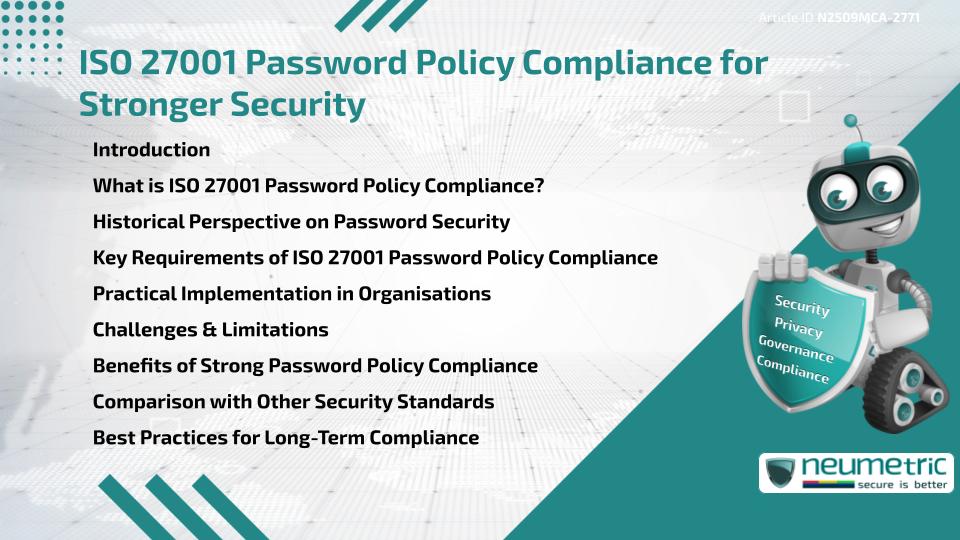Table of Contents
ToggleIntroduction
ISO 27001 Password Policy Compliance is a critical component of securing Information Systems against unauthorised access. It ensures that Organisations follow Best Practices for password management as part of their Information Security Management System [ISMS]. By enforcing strong password Policies, businesses reduce Risks of Breaches, safeguard Sensitive Data & meet International Compliance Requirements. This article explores the key elements, historical context, practical implementations, challenges & benefits of ISO 27001 Password Policy Compliance.
What is ISO 27001 Password Policy Compliance?
ISO 27001 Password Policy Compliance refers to aligning organisational password practices with the requirements of the ISO 27001 standard. This Standard outlines measures for protecting Information Assets & a Password Policy forms a vital part of Access Control. Compliance ensures that passwords are strong, updated regularly & managed securely throughout their lifecycle. It not only minimises Vulnerabilities but also supports adherence to Regulatory & Contractual obligations.
Historical Perspective on Password Security
Passwords have been used since the early days of computer systems in the 1960s. Initially, password practices were simple, with limited emphasis on complexity. However, as technology advanced & Cyber Threats grew, weak or reused passwords became a common cause of Data Breaches. Standards such as ISO 27001 introduced structured requirements to counter these Risks. Unlike older approaches that focused only on password length, ISO 27001 Password Policy Compliance emphasises holistic Controls, including Authentication, Monitoring & Review.
Key Requirements of ISO 27001 Password Policy Compliance
To achieve Compliance, Organisations must:
- Establish a formal Password Policy as part of their ISMS.
- Enforce minimum complexity, such as a mix of characters, numbers & symbols.
- Require periodic password changes to reduce the Risk of compromise.
- Restrict reuse of old passwords.
- Ensure secure Storage & Encryption of Credentials.
- Provide training & awareness for Employees on secure password practices.
These requirements work together to create a robust defense against Brute Force attacks, Phishing & Insider misuse.
Practical Implementation in Organisations
Organisations can implement Compliance by integrating Password Policy enforcement into their Access Control systems. Tools such as directory services, single sign-on platforms & password managers help enforce rules automatically. Internal Audits & Penetration Testing can verify Compliance. Employee Training plays a crucial role, as human error remains one of the leading causes of password-related breaches. Many Organisations also combine ISO 27001 Password Policy Compliance with Multi-factor Authentication for an additional security layer.
Challenges & Limitations
Despite its benefits, implementing strong Password Policies can face resistance. Employees may find frequent password changes inconvenient, leading to unsafe practices like writing them down. Additionally, enforcing overly complex rules may cause usability issues. Balancing security with practicality is a constant challenge. Organisations must tailor their Policies to business needs without diluting Compliance.
Benefits of Strong Password Policy Compliance
Compliance provides multiple benefits, including:
- Enhanced protection of Sensitive Information.
- Improved Trust with Clients & Stakeholders.
- Alignment with International Security Standards.
- Reduced Likelihood of costly Data Breaches.
By demonstrating commitment to ISO 27001 Password Policy Compliance, Organisations also strengthen their competitive edge in regulated industries.
Comparison with Other Security Standards
While ISO 27001 sets global benchmarks, other frameworks such as NIST guidelines & PCI DSS also address password security. Compared to these, ISO 27001 takes a broader approach by embedding Password Policies into an overall ISMS. This integration ensures that password management is not seen in isolation but as part of a continuous cycle of Risk Assessment & Control.
Best Practices for Long-Term Compliance
Organisations can maintain long-term Compliance by:
- Regularly reviewing & updating password Policies.
- Automating Compliance checks through system tools.
- Conducting Awareness Programs to reinforce secure practices.
- Integrating Password Controls with broader Cybersecurity measures.
Adopting these practices ensures that ISO 27001 Password Policy Compliance remains sustainable & effective.
Conclusion
ISO 27001 Password Policy Compliance is essential for building resilient Information Security defenses. By understanding its requirements, addressing challenges & implementing Best Practices, Organisations can significantly enhance their ability to protect Sensitive Assets.
Takeaways
- ISO 27001 Password Policy Compliance strengthens organisational security.
- Policies must balance complexity with usability.
- Compliance involves technical controls, training & monitoring.
- Long-term Compliance requires continuous review & improvement.
FAQ
What is ISO 27001 Password Policy Compliance?
It refers to aligning organisational password practices with ISO 27001 requirements for stronger Information Security.
Why is ISO 27001 Password Policy Compliance important?
It reduces the Risk of Data Breaches, protects Sensitive Information & supports Regulatory Compliance.
What are the key requirements of Compliance?
They include password complexity, secure storage, periodic changes, restrictions on reuse & Employee awareness.
How does it compare to other standards?
Unlike some frameworks, ISO 27001 embeds Password Policies within a full ISMS, making it more comprehensive.
What challenges exist with implementation?
Challenges include Employee resistance, usability concerns & balancing practicality with security.
Can Organisations use password managers for Compliance?
Yes, password managers support secure storage & enforcement of strong Password Policies.
How often should Password Policies be reviewed?
They should be reviewed at least annually or whenever significant Risks or system changes occur.
Need help for Security, Privacy, Governance & VAPT?
Neumetric provides organisations the necessary help to achieve their Cybersecurity, Compliance, Governance, Privacy, Certifications & Pentesting needs.
Organisations & Businesses, specifically those which provide SaaS & AI Solutions in the Fintech, BFSI & other regulated sectors, usually need a Cybersecurity Partner for meeting & maintaining the ongoing Security & Privacy needs & requirements of their Enterprise Clients & Privacy conscious Customers.
SOC 2, ISO 27001, ISO 42001, NIST, HIPAA, HECVAT, EU GDPR are some of the Frameworks that are served by Fusion – a SaaS, multimodular, multitenant, centralised, automated, Cybersecurity & Compliance Management system.
Neumetric also provides Expert Services for technical security which covers VAPT for Web Applications, APIs, iOS & Android Mobile Apps, Security Testing for AWS & other Cloud Environments & Cloud Infrastructure & other similar scopes.
Reach out to us by Email or filling out the Contact Form…


